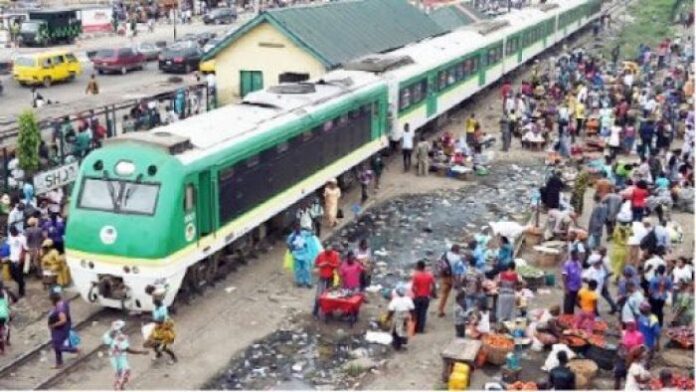By Jeph Ajobaju, Chief Copy Editor
Train ride from Lagos to Ibadan costs N2,500 on the new rail line constructed by the China Civil Engineering Construction Corporation (CCECC), in the most lucrative section of the Lagos-Kano which may take more years to complete.
Passengers are keen to try out the ride for the comforts on board, which include air conditioning and television screens, and for the novelty of transitioning from rickety coaches to luxurious ones.
Nigerian Railway Corporation (NRC) officials are, however, banking on port hauling service from Lagos to the hinterland to generate profit to pay off the $1.3 billion loan Nigeria obtained from China to modernise a rail line built in 1926.
The report below by Quartz Africa traces the history of railway in Nigeria, the new involvement of China, and how Nigeria compares with Kenya in this type of project.
Historical background
Railway in Nigeria dates back to the 19th century when the first railroad was constructed in 1898 under British colonial rule before the modern country was created in 1914.
But over decades, after the 1955 enactment of the Nigerian Railway Corporation Act failed to result in a robust system, the railway network has crumbled.
Its woes peaked in 1988 when the NRC declared bankruptcy and even though there have been several failed attempts to resurrect it, none has been as extensive as the current multibillion-dollar overhaul by the administration of President Muhammadu Buhari, led by Chinese funding and expertise, like elsewhere in Africa.
The 156-kilometre Lagos-Ibadan railway costs $1.5 billion and runs from Lagos to Ibadan, the second largest city in the South West, and, subsequently, with additional funding, on to Northern cities.
Chinese funding
The project is funded by a $1.3 billion loan from the Export-Import Bank of China and about $182 million from the Nigerian government.
The Lagos-Ibadan line is a critical section of the broader $11.1 billion 2,733 kilometre Lagos-Kano standard-gauge North-South railway being constructed by CCECC.
The Lagos-Ibadan corridor is easily one of the most important for Nigeria’s economy as it connects the commercial capital to the rest of the country.
But over the years the main Lagos-Ibadan expressway has been overwhelmed with traffic, never-ending reconstruction, and unfulfilled expansion plans.
The hope is the railway line will help ease some of the commercial traffic from the ports and beyond which clog up the dilapidated expressway.
NRC officials consider port hauling service, not intercity travellers, to be sufficient for the service to be profitable and to generate enough funds to pay off the loan from China.
But recent experience in Kenya suggests this plan is fraught with danger if other components required for its fruition are not in place.
Kenya’s Chinese-built $3.2 billion Standard Gauge Railway connecting its capital city Nairobi and the port city of Mombasa has lost $200 million in just three years of operation.
One key reason is that the rail is not attractive to cargo owners because of its higher fees and tariffs, additional time clearing goods, and a lack of last-mile delivery, when compared to trucks.
Kenya’s road network is not as overwhelmed as in Nigeria, meaning Kenyan commercial operators have to be incentivised to use the rail. Users of the Lagos-Ibadan railway see it as an opportunity to rethink and rejig a transportation system over-reliant on a road network poorly maintained and underdeveloped.
Aside from Nigeria’s poor and crumbling road network and infrastructure, Lagos, the epicentre of its economic activities, is overcrowded with more than 20 million residents.
Current leisure and business travellers see the new rail line as a safer and less stressful option than the busy expressway.
Akin Akinwale, a communications strategist in his mid-thirties described the train service as a welcome development. “It’s a great experience. It will open up the economy of every of those train stations along the line.”
Nigerians learning Mandarin
On board the trains the informational video screens feature Chinese nationals; several on-board essential tools such as fire extinguishers, water dispensers, and pressure gauge are in Mandarin.
This caught the eye of several passengers on the ride with Quartz.
Bayo Adeoye, an Ibadan-based businessman who was trying out the train service to commute to Lagos for his regular business meetings, argued that even though the project is in Nigeria, it belongs to China.
“They are intentionally letting everyone know China owns it. It is too bold to be coincidental and it seems like there is nothing the Nigerian government can do about it,” Adeoye said.
The NRC told Quartz it would complete the localisation of information material on the trains when all the aspects of the project are completed and officially handed over to the government.
That final handover was expected to happen at the end of January but there is still plenty of construction work going on at the various stations along the two-hour and 40 minute journey.
Beyond the banners and other physical Chinese paraphernalia, some Nigerian workers say they’re taking Mandarin lessons to improve their job security chances given some of their current managers are Chinese.
“I’m learning Mandarin on YouTube because I love this job and I know if I can communicate directly with the Chinese people they will keep me on the job and may also promote me,” a Nigerian railway engineer, who asked not to be named, tells Quartz.
However, NRC officials say learning Mandarin is unnecessary as the Chinese managers working on the project have interpreters to communicate with Nigerians.
Eric Olander, managing editor of The China Africa Project, says because the people and equipment all come from China when building such large infrastructure projects, it shouldn’t be a huge surprise the Chinese language is evident now.
“That’ll change, though, in a few years when the Chinese presence retreats and the train systems are handed over to be fully operated by local stakeholders,” Olander told Quartz.
Nigeria avoiding Kenya’s pitfalls
Nigeria had borrowed $3.121 billion from China as of March 31, 2020 representing just under 4 per cent of Nigeria’s total public debt or 11.3 per cent of external debt, according to the Debt Management Office in Abuja.
Unlike some African countries Nigeria is conservative in its financial dealings with China, but there is little doubt Chinese developers and technicians are all over major infrastructure projects throughout Africa’s largest economy.
From major road network rehabilitation to new airport terminals and electricity projects, the Chinese presence is clear. But as elsewhere in Africa this is especially true with railway construction or “modernisation” projects.
Olander attributed Africa’s rail boom in the past decade to China’s indispensable roles in providing access to capital and actually building the railways.
Nigeria has a better chance of avoiding some of the pitfalls of Kenya, which looks like it may struggle to pay back its loans. Nigeria’s railway project costs less and has a stronger cash flow than Kenya as long as oil prices do not fall rapidly.
“For the most part, it looks like the Nigerian government’s been doing quite a good job. Contrary to widespread misperceptions, Nigeria doesn’t actually borrow that much from China and what they do borrow is used to build strategically essential infrastructure,” Olander said.












